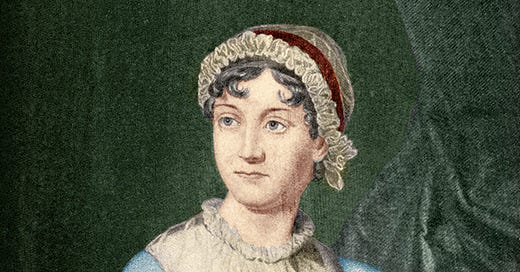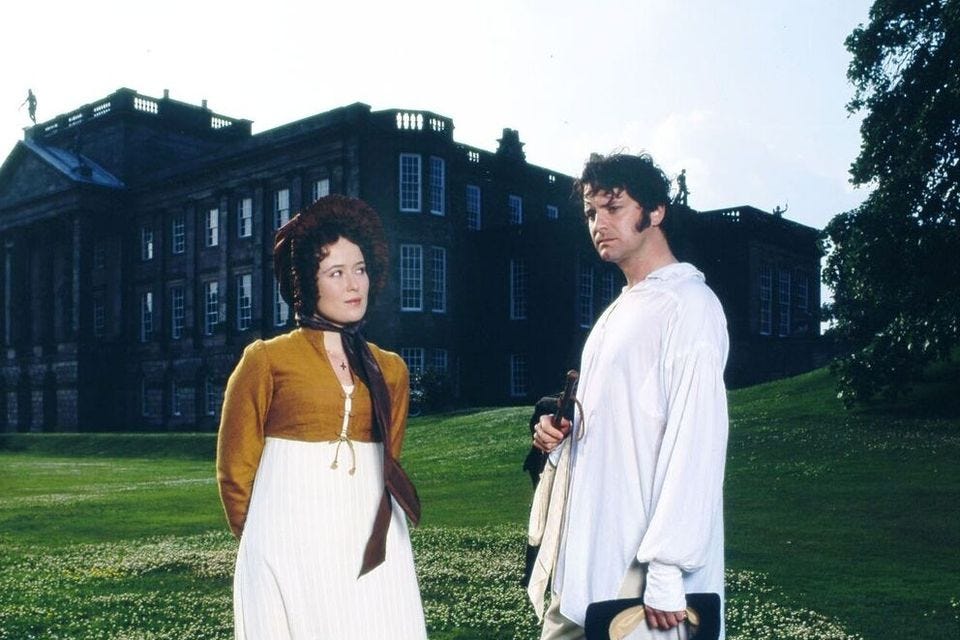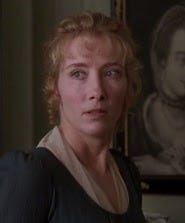Anniversaries are ridiculous, really. Why should Jane Austen be commemorated more in 2025, because she was born two and a half centuries ago, rather than in 2024 or 2026? But they do serve a purpose, in that they constitute that thing one always dreads being asked about when pitching an idea, a ‘hook’ (as in: what’s the hook), upon which publicity can be comfortably hung.
Not that Jane Austen needs it.
She went mega, did she not, after that 1995 Pride and Prejudice adaptation (which I sometimes think I am the only person in the world to have hated, although I usually revere Andrew Davies). From it emerged a whole new way of misinterpreting the novels, a way that flatters feminine fantasies without betraying feminist ideology: the notion, cleverly nurtured via Bridget Jones and other such products of the Relatable School, that Jane Austen creates ‘modern’ heroines. Elizabeth in particular. The woman who gets her man by Being Herself. Which she does, yes, but there is maybe a bit more to it than that…
In his recent essay on Jane Austen, the wonderful
suggests that, in order fully to appreciate the books, one simply must treat the adaptations as something separate - there is almost no point of connection between the two. I completely agree (as well as the subtlety, what so often seems missing is the moral dimension), although I would make two exceptions: the film of Sense and Sensibility, also 1995 and with a beautiful script that won Emma Thompson an Oscar, which so movingly conveyed the genteel panic that gripped families like the Dashwoods (how to remain on the tightrope?) as time - and opportunity - passes. When Emma Thompson, who also plays Elinor, lets herself go at the end, one realizes precisely the tension under which women of her well-behaved kind were obliged to live.Then - and very different - the 2016 film Love and Friendship, Whit Stillman’s radiantly intelligent adaptation of Lady Susan, almost unbearably delicious at times in its textured wit and priceless pauses. Stillman girl Kate Beckinsale is sublime as sexy, capable, devious Lady S (‘I had a feeling that the great word 'respectable' would some day divide us’) while the film also contains perhaps my favourite ever cinematic comedy performance, which once rendered me uncomfortably hysterical in an economy seat on a long-haul flight: Tom Bennett as the rich, idiotic, touchingly sweet Sir James Martin. Watch him on YouTube learning that there are ten commandments, rather than the twelve that he had thought, which he interprets with pleasure as meaning that only ten need be obeyed: ‘Which two to take off? Perhaps the one about the Sabbath - I prefer to hunt. After that, it becomes tricky’).
Imbecile though he be, Sir James must also be taken seriously in the Austen world because he has money. To Lady Susan, he is an ace that might save her chancy hand. Such a situation could of course arise today, but here it is the heart of the matter. When I wrote my 2021 book Heiresses (determined not to let it become a homage to yachts and parures, which I suspect is what my publisher really wanted) I found myself constantly thinking about Jane Austen, appreciating her all over again; thinking in particular about the vital role of money in her novels, the financial imperative behind incidents such as Wickham’s attempted filching of Georgiana Darcy or Willoughby’s terrible ghosting of Marianne.
As readers were so generous in response to my most recent essay, which told a Dickens-related story from Heiresses - and as it is that 250th anniversary - it seemed a good idea to post this Austen-related extract from the book’s introduction…
In fiction, in general, the heiress does not have a very good time of it.
Take, for instance, the pallid little figure of Anne de Bourgh in Jane Austen’s 1813 novel, Pride and Prejudice. Anne is the only child of the widowed Lady Catherine de Bourgh, and as such will inherit the superb estate of Rosings Park. Meanwhile the Bennet girls at the centre of the novel— Jane, Elizabeth, Kitty, Mary and Lydia— are hamstrung by genteel poverty because their family estate, worth £2,000 a year, can only be passed on to a male heir. Lady Catherine states that she can see “no occasion for entailing estates away from the female line”; which might be seen as admirable proto-feminism, were it not for the arrogance of the speaker. From her, it sounds like mere self-validation and— strikingly— like a put- down of the novel’s heroine, Elizabeth Bennet.
For Lady Catherine is threatened by Elizabeth. Why should she be? Anne is an heiress: supremely marriageable, in an age when marriage was seen as a woman’s natural destiny. By rights she is the greatest prize among the group of young women— the Bennet girls, Caroline Bingley, Charlotte Lucas—who fight to succeed in this polite and unyielding arena.
Yet Anne is the most insignificant of them all. Described as “pale and sickly,” she sits near-silent at the Rosings dinner table and is glimpsed like a ghost inside her carriage. There is no sense that her fortune makes her happy or blessed; in fact there is scarcely any sense of her at all.
By contrast, Elizabeth blooms. Her personality is the life force of the novel. She is physically at ease with herself, and her sense of humour—“I dearly love a laugh”— is delicately anarchic. Most importantly, she has a sense of self-worth that no insult or reversal can touch. This worries Lady Catherine, for it suggests that her own scale of values is not the only one in town. Here is a girl without fortune, an anti-heiress as one might say, who simply refuses to countenance the idea that she should feel inferior on that account. Instead, and without in the least meaning to do so, Elizabeth suggests through her artless confidence that Anne de Bourgh is her inferior.
And indeed, when it comes to marriage— the means by which a young woman proved her worth—Elizabeth does triumph; thereby more than justifying Lady Catherine’s unease. The intention had been that Anne de Bourgh should marry her cousin, Darcy, whose Pemberley home is on the splendour level of Rosings. A union of two estates, therefore, rather than two individuals; wealth calling to wealth, as was perfectly normal practice. Elizabeth, however, is the rogue factor. Like Lady Catherine, Darcy feels threatened by her (who is this girl?) but he is also beguiled. His aunt, meanwhile, has forgotten that a man as rich as Darcy can marry whomsoever he chooses, and has absolutely no need of an heiress as terminally insipid as Anne.
For all its reputation as a love story, Pride and Prejudice is really a novel about money.
Keep reading with a 7-day free trial
Subscribe to Laura Thompson’s Substack to keep reading this post and get 7 days of free access to the full post archives.








